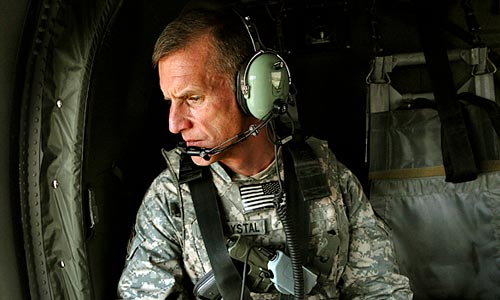General McChrystal's report on Afghanistan and external influences

The Washington Post has leaked an unclassified version of General Stanley McChrystal's long-awaited report on Afghanistan. The full report, all 66 pages, can be found here.
The Washington Post provides a good roundup of the report. In short, and it should come as no surprise, McChrystal calls for a change in strategy by ISAF, which has failed to properly implement a counterinsurgency program to defeat the Taliban and allied groups. ISAF must focus on securing the population, aiding in providing good governance, building and mentoring the Afghan security forces, and shifting itself away from an excessively defensive posture to enable the troops to engage with the Afghan people.
While McChrystal doesn't say so in this report, he wants more troops. He repeatedly describes the Afghan effort as "under-resourced." We won't know the numbers of troops requested until the next report is released. And it should be soon, as McChrystal is clear that the Taliban have the initiative and time is of the essence.
There are a couple of redacted sections of the report that would have made interesting reading, such as information on Taliban operations and the groups' command and control, and Taliban control throughout the country.
One part of the report that will get lost in the inevitable political debate on the Afghan surge will be McChrystal's assessment of "External Influences" on Afghanistan. The assessments are brief but reinforce the available information on the safe havens in Pakistan and the ISI's role in aiding the Taliban, as well as the role of Iran's Qods Force in training and arming elements of the Taliban. The paragraphs on Pakistan and Iran are excerpted in full below.
External Influences
Pakistan. Afghanistan's insurgency is clearly supported from Pakistan. Senior leaders of the major Afghan insurgent groups are based in Pakistan, are linked with al Qaeda and other violent extremist groups, and are reportedly aided by some elements of Pakistan's ISI. Al Qaeda and associated movements (AQAM) based in Pakistan channel foreign fighters, suicide bombers, and technical assistance into Afghanistan, and offer ideological motivation, training, and financial support. Al Qaeda's links with HUN [I assume this should be HQN, or Haqqani Network] have grown, suggesting that expanded HQN control could create a favorable environment for AQAM to re-establish safe-havens in Afghanistan. Additionally, the ISAF mission in Afghanistan is reliant on ground supply routes through Pakistan that remain vulnerable to these threats.Stability in Pakistan is essential, not only in its own right, but also to enable progress in Afghanistan. While the existence of safe havens in Pakistan does not guarantee ISAF failure, Afghanistan does require Pakistani cooperation and action against violent militancy, particularly against those groups active in Afghanistan. Nonetheless, the insurgency in Afghanistan is predominantly Afghan. By defending the population, improving sub-national governance, and giving disenfranchised rural communities a voice in their government, GIRoA - with support from IsAF - can strengthen Afghanistan against both domestic and foreign insurgent penetration. Reintegrating communities and individuals into the political system can help reduce the insurgency's virulence to a point where it is no longer an existential threat to GIRoA.
...
Iran. Iran plays an ambiguous role in Afghanistan, providing developmental assistance and political support to GIRoA while the Iranian Qods Force is reportedly training fighters for certain Taliban groups and providing other forms of military assistance to insurgents. Iran's current policies and actions do not pose a short-term threat to the mission, but Iran has the capability to threaten the mission in the future. Pakistan may see Iranian economic and political initiatives as threats to their strategic interests, and may continue to address these issues in ways that are counterproductive to the ISAF effort.
